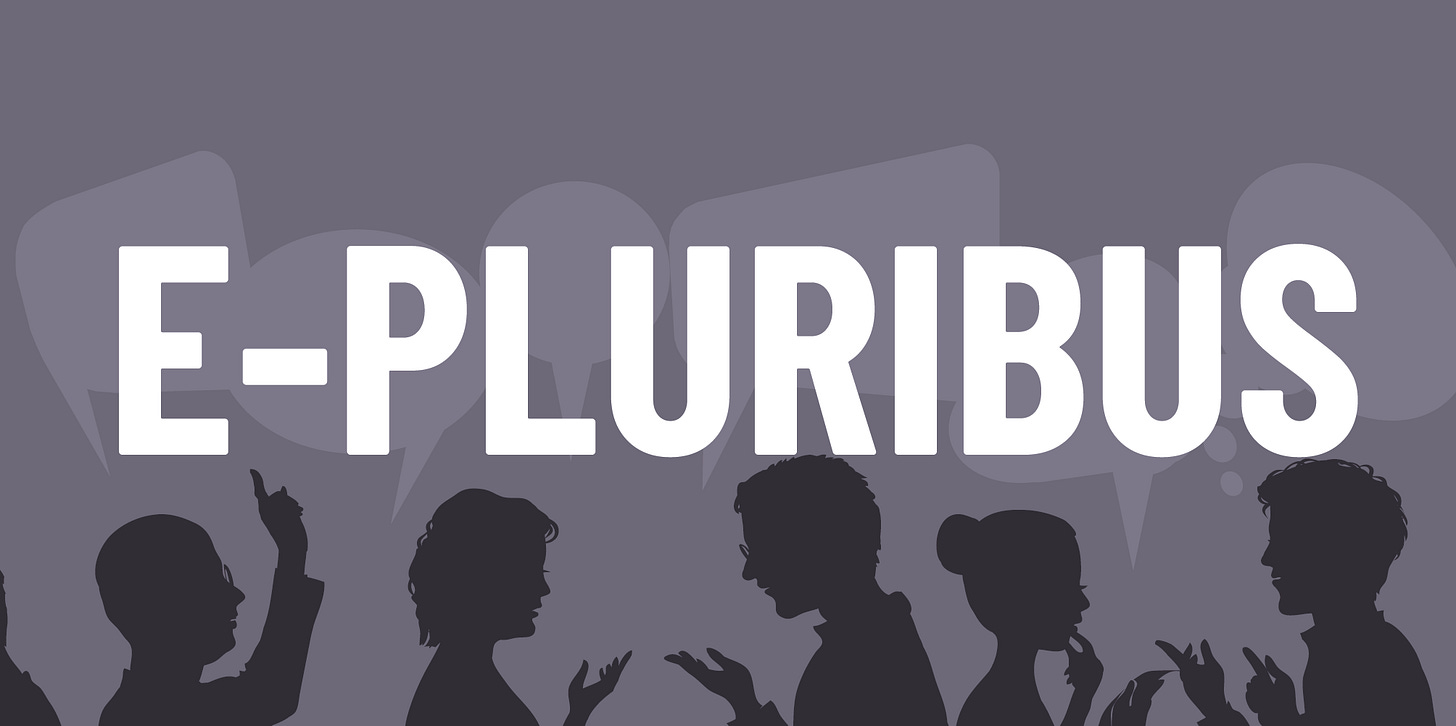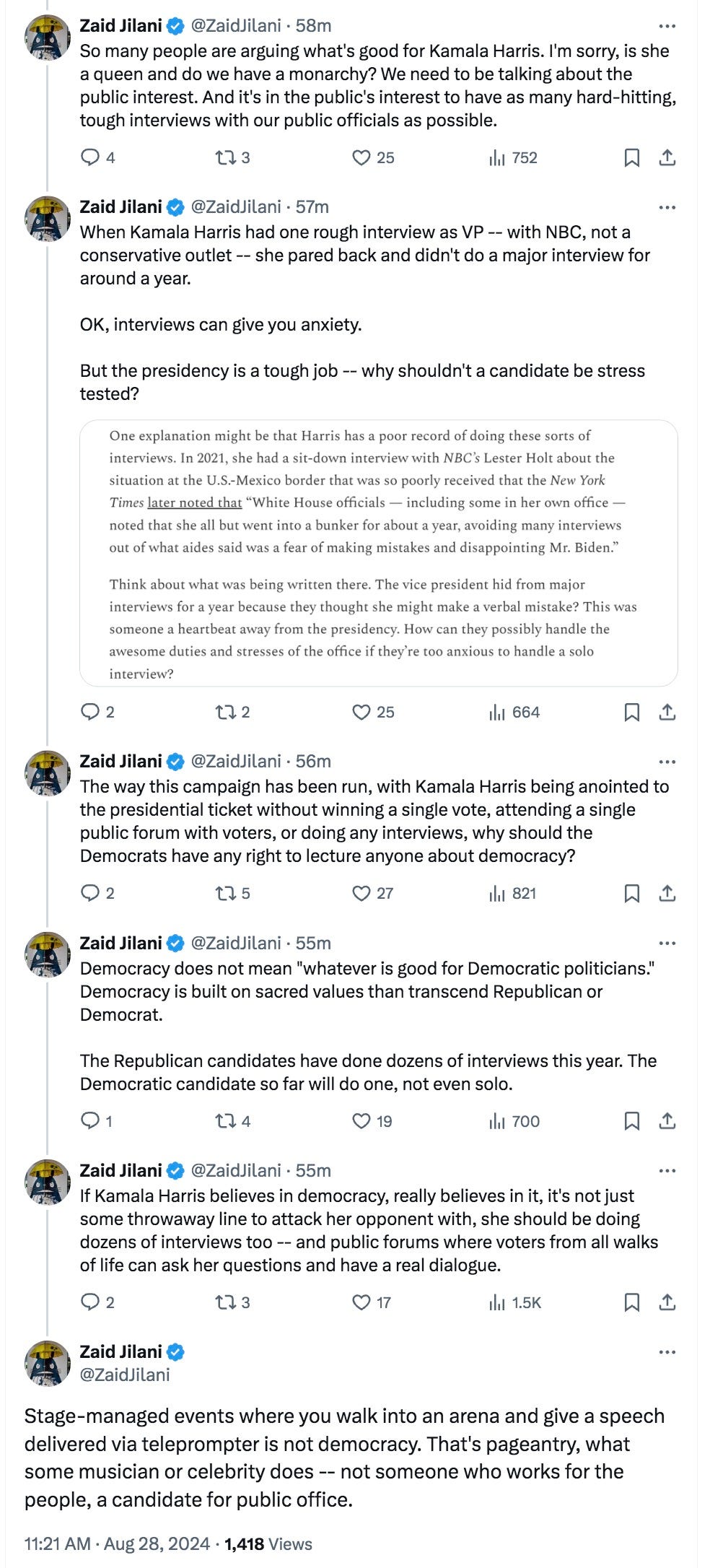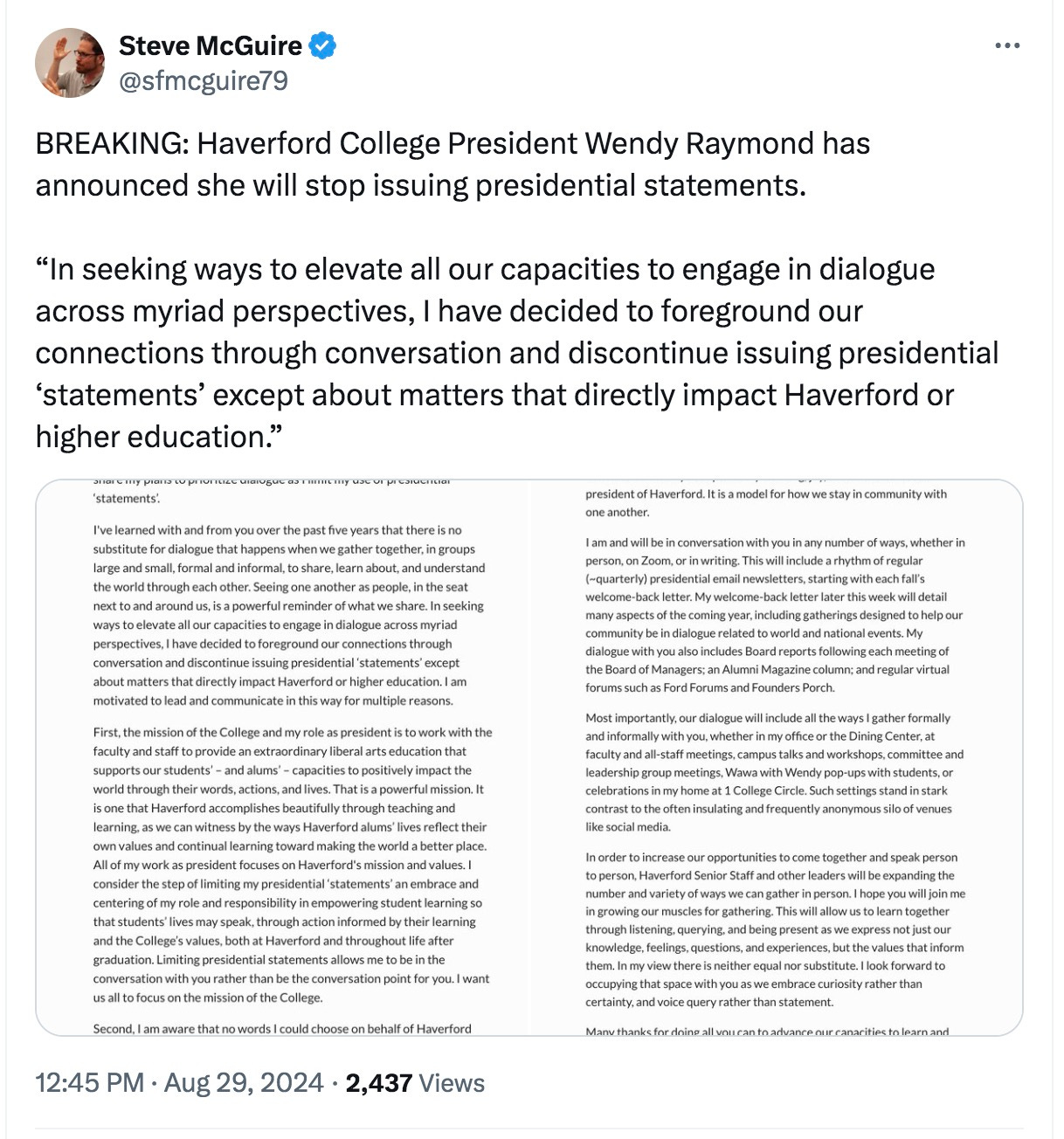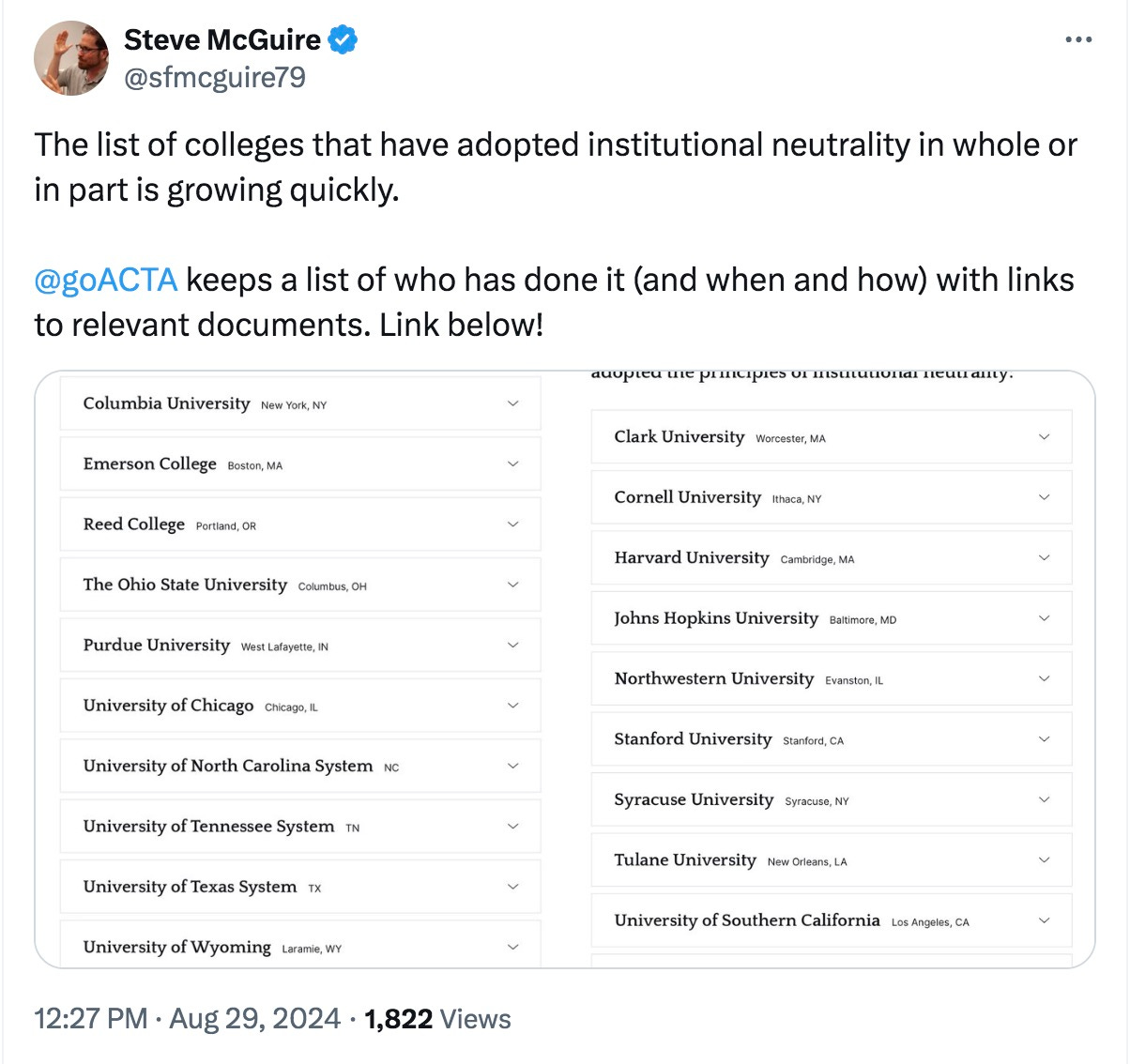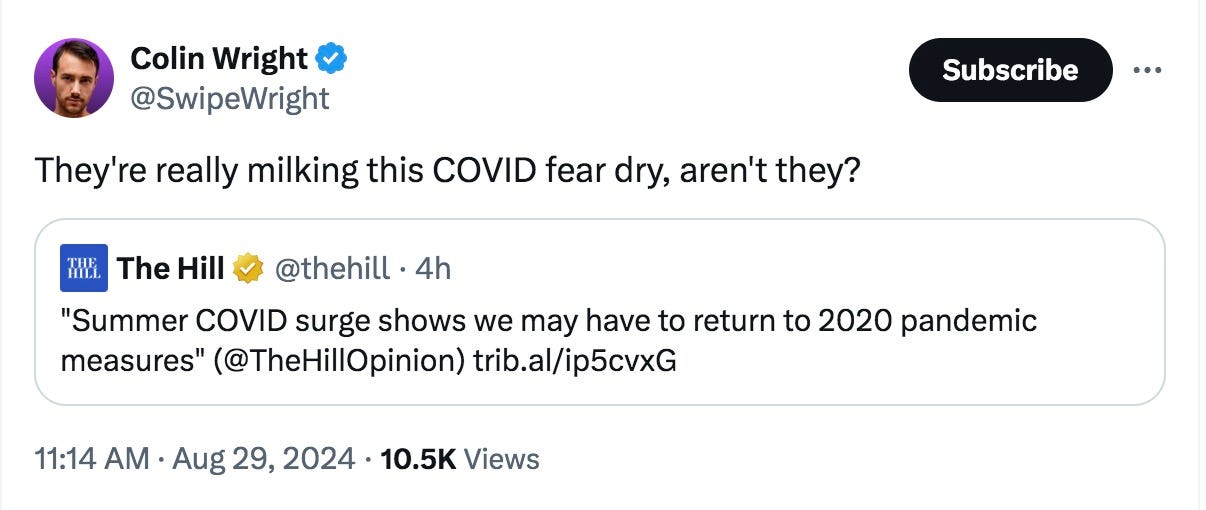E-Pluribus | August 29, 2024
Tablets (and illusions) shattered; myopic moral outrage; and students are learning (to cancel others).
A round-up of the latest and best musings on the rise of illiberalism in the public discourse:
Joshua Leifer: My Demoralizing but Not Surprising Cancellation
Much of the “book banning” furor is overblown, but a Brooklyn bookstore added a new twist by banning an author. At The Atlantic, Joshua Leifer relates his recent experience at what was supposed to be a book launch for his new title. However, after the bookstore discovered Leifer was to be accompanied at the launch by a (gasp!) Zionist, the invitation was unceremoniously revoked.
Last Tuesday, I was supposed to have launched my first book, Tablets Shattered: The End of an American Jewish Century and the Future of Jewish Life, with an event at a bookstore in the Brooklyn neighborhood of Dumbo—a conversation between me and the well-known Reform rabbi Andy Bachman.
The event didn’t happen. About an hour before the intended start, I heard from my publicist that the bookstore had “concerns” about Rabbi Bachman because he was a “Zionist.” I received another call while in a car on the way to the store: The manager was now refusing to host the conversation with the rabbi. When I arrived, I asked her why she would not permit the event to go forward as planned. Her response: “We don’t want a Zionist onstage.”
I was taken aback. Rabbi Bachman is an outspoken social-justice advocate and a supporter of the establishment of a Palestinian state (and my former teacher). My book is a history of American Jewish life in the second half of the 20th century, and deals critically with Israel’s treatment of Palestinians. Because of my analysis of the Israeli-Palestinian conflict, as well as my reporting about and public opposition to Israel’s military occupation of the West Bank and siege of Gaza, I had feared that synagogues would be reluctant (and surely some still are) to host events. I did not anticipate that the trouble would come from a bookstore in Brooklyn.
Then again, perhaps I should not have been surprised at all. Since October 7, the public discourse on Israel and Palestine has curdled. Some right-wing supporters of Israel have become cheerleaders for violence. In certain spaces that call themselves progressive, intolerance has become endemic and conspiratorial thinking is on the rise. The result across the board: Nuance has evaporated, and humanity is in short supply.
Read the whole thing.
Bret Stephens: Can We Be a Little Less Selective With Our Moral Outrage?
Perhaps you have heard about the campus sit-ins for Venezuela? Flood the Campus for Turkey? University square encampments for Ethiopia and Sudan? No? Neither has the New York Times’ Bret Stephens. Stephens uses his latest column to urge readers to broaden the focus beyond Gaza and Ukraine to a whole world of suffering going on right under our collective noses.
Of all the world’s injustices, perhaps the saddest is that so many of them are simply ignored.
Protesters the world over loudly demand a cease-fire in Gaza; a dwindling number of people still take note of Russian atrocities against Ukraine. Otherwise, there’s a vast blanket of silence, under which some of the world’s worst abusers proceed largely unnoticed and unhindered.
[. . .]
Venezuela. Last month’s election was stolen in broad daylight by the socialist regime of Nicolás Maduro. He has enforced this theft by using his security services to round up and jail around 2,000 people suspected of dissent, promising “maximum punishment” and “no forgiveness.” This is from a regime that has already caused starvation and the desperate exodus of millions of poor Venezuelans. As of last year, more than 10,000 of them were living in New York City shelters.
[. . .]
Turkey. Anti-Israel protesters sometimes respond to the criticism that they are singling out the Jewish state for unfair censure by noting that it receives billions in military aid from Washington. (This pretext doesn’t fly if protests are in Montreal or Melbourne.) But what about another Middle Eastern recipient of American largess, including the stationing of U.S. troops and nuclear weapons?
[. . .]
Ethiopia and Sudan. Critics of U.S. foreign policy, particularly on the left, often complain that Washington cares more about suffering among white people than Black people. They have a point. So why do those same critics proceed to largely neglect the staggering human rights abuses taking place now in Sudan and Ethiopia?
[. . .]
Iran. The regime in Iran ought to tick every box of progressive outrage. Misogyny? As CNN documented in 2022, the government responded to mass protests against mandatory hijab by systematically raping protesters, men as well as women. Homophobia? Homosexuality is legally punishable by death, and executions are carried out.
Read it all.
Samuel J. Abrams: The Dangerous Evolution of Cancel Culture
Who says students aren’t learning anything at college? At Minding the Campus, Samuel Abrams writes that, unfortunately, students are learning cancel culture. Abrams argues that it’s not only a faculty and administration problem; hearts and minds of students toward those with whom they disagree need to change as well.
Academic boycotts targeting ideas, individuals, and institutions deemed problematic are no longer just in vogue for faculty. This illiberal and anti-intellectual tactic has now been adopted by students—presumably taking a cue from faculty and administrators—to cancel faculty who hold views they disagree with.
[. . .]
Cancel culture, as we know it, mostly occurs through social media, which anyone with an internet connection can view. While that’s bad enough, this tactic of directly messaging students is a chilling evolution of cancel culture that threatens speech, expression, learning, and open inquiry.
The culture of vocal, organized, and illiberal forces is now driving students away from courses these groups find objectionable. Unlike larger, more diffuse schools like Pace University or New York University, smaller residential schools like Sarah Lawrence College—where everyone knows everyone and reputations are critical—face amplified risks. When students are directly messaged about a boycott, it clearly signals that enrolling in my class could be risky. Such a culture is the antithesis of a true collegiate education. It is nearly impossible to stand against a mob that has declared someone persona non grata. While protesting a professor in the public sphere is one thing, directly targeting and approaching students through multiple channels raises the stakes, significantly increasing the intimidation for those who refuse to fall in line.
[. . .]
Another powerful and devastating illustration of these forces was just revealed at Haverford College. As a prospective student explained: ‘First, [I] had some great conversations with other students, but when they hear that I went to Jewish Day School and am a Jew, I get asked almost immediately if I support Israel, and if I’m Zionist, I either get blocked or ridiculed by other Haverford students who I barely even know.’
[. . .]
Students can inflict actual harm on their peers by depriving them of opportunities to learn and explore and by destroying their chances of gaining a liberal education. This will be a real challenge to combat and will be harder to address than simply breaking up illegal demonstrations and stopping organized violence. It requires changing the hearts and minds of students through a cultural shift towards real tolerance that may be impossible given the political activism and anti-Semitism preferred by so many faculty and administrators, permeating everything from dining halls to dorms along with campus centers and faculty offices.
Read it all here.
Around Twitter (X)
Zaid Jilani is a little annoyed at the deference being shown to Kamala Harris:
Via Steve McGuire, baby steps towards institutional neutrality at Harvard (plus a broader update from Steve):
And finally, deja vu all over again?



